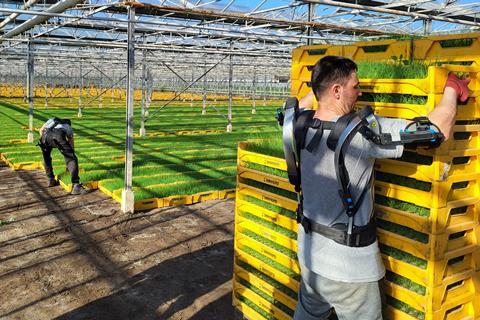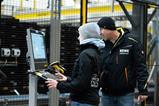Skelex and employment agency ProKonak are testing mechanical devices that support workers’ arms, shoulders and lower back during repetitive tasks

Workers at a greenhouse in the Dutch region of Westland are taking part in a trial to assess the benefits of wearable exoskeletons, mechanical devices that assist movement and reduce physical strain.
Located just outside The Hague, the pilot is run by Skelex, a company that develops mechanical tools designed to reduce the physical strain of repetitive work, in partnership with employment agency ProKonak.
The exoskeletons, which do not need a power supply, are designed to help greenhouse workers avoid fatigue and injuries by supporting their arms, shoulders, and lower back – areas that can often be affected by repetitive tasks like tying plants, pruning, lifting crates, or working in squatting positions.
According to Skelex, its suits return energy to the wearer, thereby easing repetitive motions in labour-intensive jobs.
Two models are being tested: one that supports workers performing overhead tasks such as tying tomato plants to strings; and another that relieves strain during low-to-the-ground work like clipping or attaching items to potted plants.
“The development of exoskeletons started at TU Delft and TNO to prevent back and other complaints during aircraft maintenance,” explains Bart Bakkum, managing director at Skelex.
“Over ten years, the original prototype evolved into a lightweight and ergonomic product, already being used by many people around the world in all kinds of industries.”
If the pilot continues to show positive results, ProKonak said it would extend the use of such exoskeletons to other phases of the production chain, like packaging and logistics.
“We want our people to feel good, stay healthy, and enjoy their work,” says ProKonak account manager Turgut Colakoglu. “This isn’t just about preventing injuries – it’s about making physical work more sustainable in the long run, for everyone involved.”








